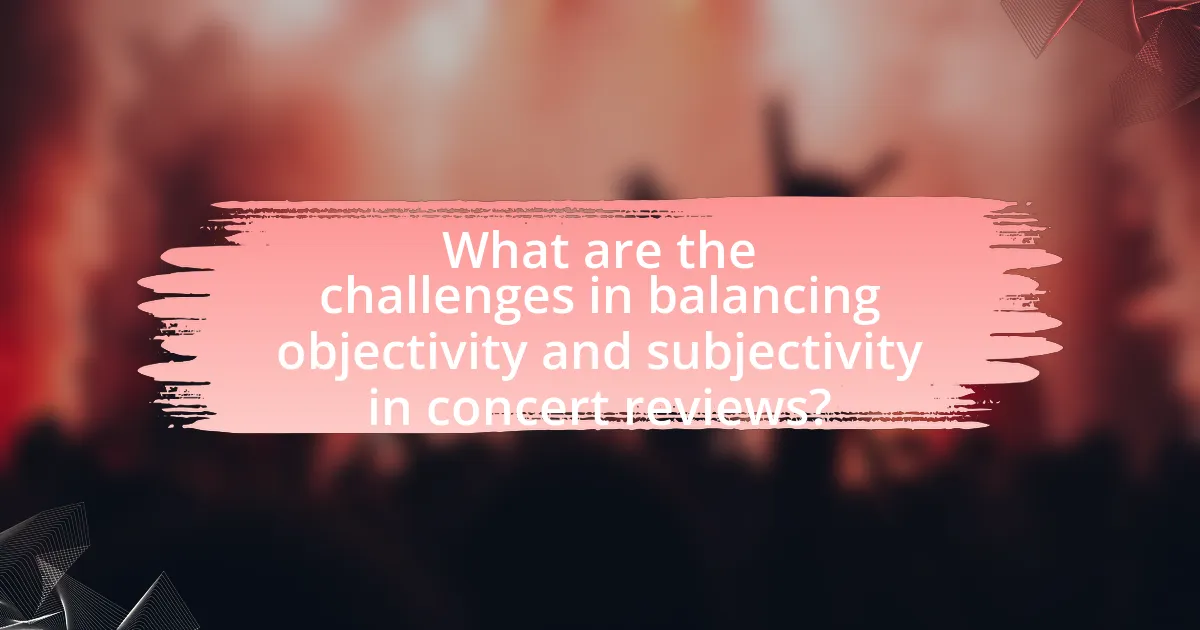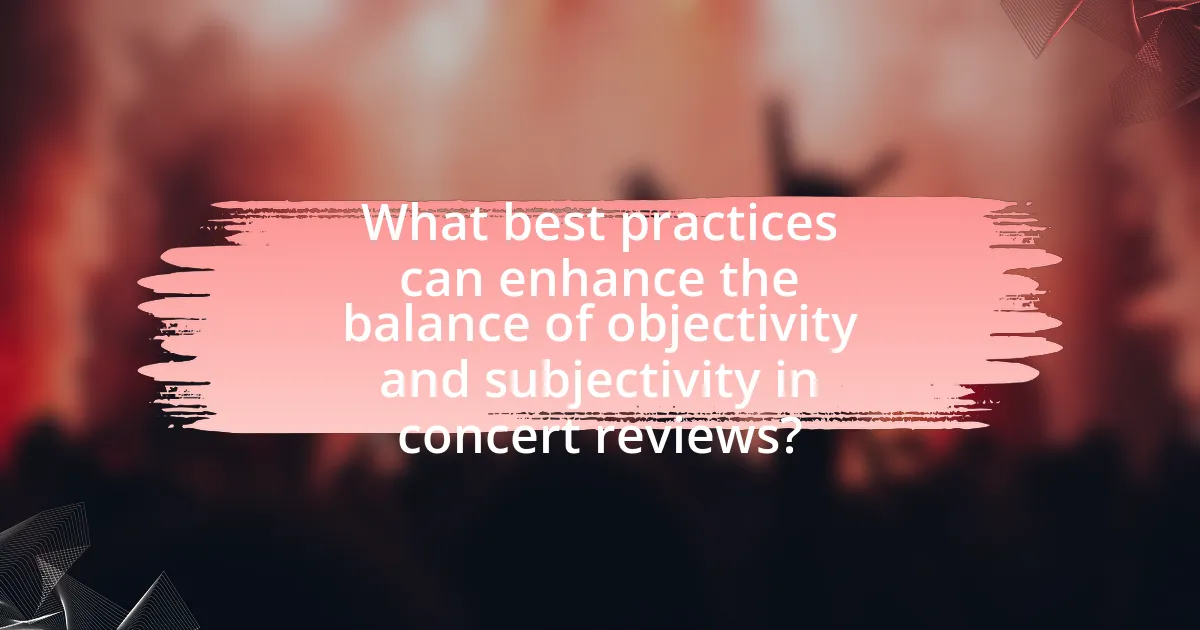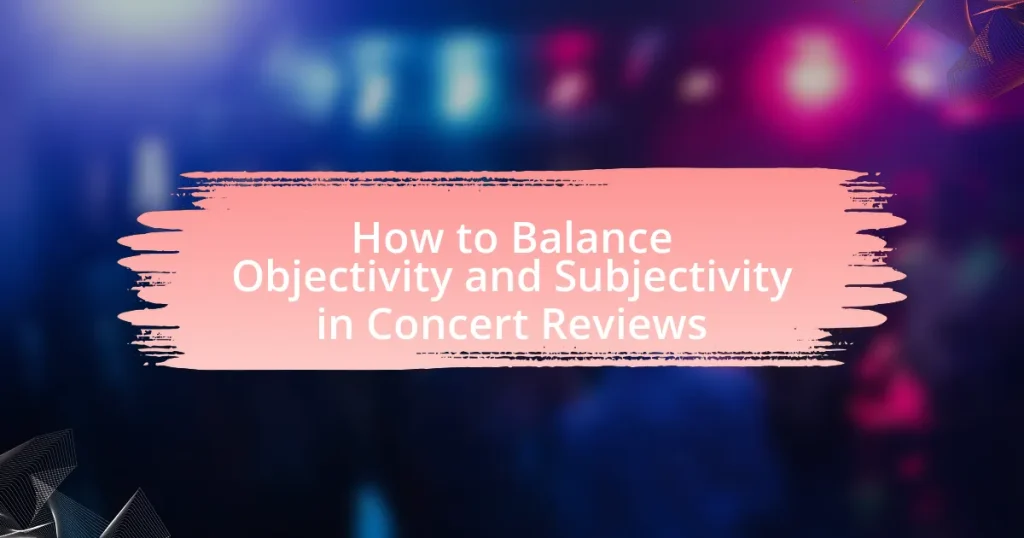The article focuses on the essential balance between objectivity and subjectivity in concert reviews, emphasizing the integration of factual analysis with personal impressions to create a comprehensive evaluation of performances. It outlines the importance of objectivity in ensuring unbiased assessments based on measurable elements such as sound quality and technical proficiency, while also highlighting the role of subjectivity in conveying emotional responses and personal experiences. Key strategies for achieving this balance include employing structured evaluation frameworks, utilizing peer feedback, and incorporating specific examples to support opinions. The article also addresses common challenges and pitfalls reviewers face, providing best practices to enhance the credibility and relatability of concert critiques.

What does it mean to balance objectivity and subjectivity in concert reviews?
Balancing objectivity and subjectivity in concert reviews means integrating factual analysis with personal impressions to provide a comprehensive evaluation of a performance. Objectivity involves assessing elements such as sound quality, stage presence, and technical proficiency, while subjectivity encompasses the emotional response and personal enjoyment of the concert. This balance allows reviewers to present an informed critique that reflects both the measurable aspects of the performance and the unique experiences of the audience, ultimately enhancing the review’s credibility and relatability.
Why is objectivity important in concert reviews?
Objectivity is important in concert reviews because it ensures that the evaluation of a performance is based on factual observations rather than personal biases. This impartiality allows readers to form their own opinions based on a balanced assessment of the music, performance quality, and overall experience. For instance, a review that objectively analyzes the technical skills of musicians, the acoustics of the venue, and the setlist can provide a clearer understanding of the concert’s merits. By focusing on these elements, reviewers can offer insights that are universally applicable, making their critiques more credible and valuable to a diverse audience.
What are the key elements of objectivity in music criticism?
The key elements of objectivity in music criticism include factual analysis, avoidance of personal bias, and reliance on established criteria for evaluation. Factual analysis involves assessing the music based on measurable elements such as melody, harmony, rhythm, and instrumentation, rather than personal feelings or preferences. Avoidance of personal bias requires critics to recognize their own subjective influences and strive to minimize their impact on the review. Reliance on established criteria for evaluation means using recognized standards within the music community, such as genre conventions and historical context, to provide a balanced perspective. These elements ensure that music criticism remains fair and informative, allowing readers to form their own opinions based on objective assessments.
How can objectivity enhance the credibility of a concert review?
Objectivity enhances the credibility of a concert review by providing an unbiased assessment of the performance, which allows readers to trust the reviewer’s insights. When a reviewer focuses on factual elements such as the quality of the musicianship, the setlist, and the venue’s acoustics, it establishes a foundation for reliability. Research indicates that reviews grounded in objective criteria are perceived as more trustworthy; for instance, a study published in the Journal of Musicology found that audiences favor reviews that balance personal opinion with factual analysis, leading to higher perceived credibility. Thus, objectivity not only strengthens the review’s authority but also fosters a more informed audience.
What role does subjectivity play in concert reviews?
Subjectivity plays a crucial role in concert reviews by influencing the personal interpretation and emotional response of the reviewer to the performance. This personal perspective shapes the narrative of the review, as individual tastes, experiences, and biases affect how the music, performance quality, and atmosphere are perceived. For instance, a reviewer who has a strong affinity for a particular genre may highlight aspects that resonate with their preferences, while downplaying elements that do not align with their views. This subjectivity is essential for providing a diverse range of opinions, which can help readers form their own expectations and preferences regarding live performances.
How does personal experience influence a concert review?
Personal experience significantly influences a concert review by shaping the reviewer’s perceptions, emotions, and interpretations of the performance. A reviewer’s background, including their musical preferences, past concert experiences, and emotional connections to the artist, can lead to subjective evaluations that color their critique. For instance, a reviewer who has a long-standing admiration for a band may perceive their performance more favorably compared to someone who is unfamiliar with their work. This subjectivity can manifest in the language used, the aspects of the performance highlighted, and the overall tone of the review, ultimately affecting how readers interpret the review.
What are the benefits of incorporating subjective opinions in reviews?
Incorporating subjective opinions in reviews enhances the richness and relatability of the content. Subjective opinions provide personal insights and emotional connections that objective facts alone cannot convey, making the review more engaging for readers. For instance, a study published in the Journal of Consumer Research found that reviews with personal anecdotes significantly influenced consumer trust and purchase intentions, demonstrating that subjective elements can enhance credibility and relatability. This blend of personal experience with factual information allows readers to form a more comprehensive understanding of the subject, ultimately leading to more informed decisions.
How can reviewers effectively balance objectivity and subjectivity?
Reviewers can effectively balance objectivity and subjectivity by employing a structured evaluation framework that incorporates both factual analysis and personal interpretation. This approach allows reviewers to assess elements such as performance quality, technical skill, and audience engagement objectively, while also integrating their emotional responses and personal experiences to provide a holistic view. Research indicates that using a rubric can help maintain objectivity by standardizing criteria, while reflective writing can capture subjective impressions, ensuring that both aspects are represented in the review.
What strategies can be employed to maintain a fair perspective?
To maintain a fair perspective in concert reviews, one effective strategy is to employ a balanced approach that incorporates both objective observations and subjective experiences. This involves documenting specific details such as the performance quality, sound clarity, and audience engagement while also reflecting on personal emotional responses and interpretations. Research indicates that reviewers who blend factual analysis with personal insights provide a more comprehensive view, enhancing the credibility of their assessments. For instance, a study published in the Journal of Musicology highlights that reviews combining technical critique with emotional context resonate better with readers, leading to a more nuanced understanding of the concert experience.
How can reviewers ensure their personal biases do not overshadow the review?
Reviewers can ensure their personal biases do not overshadow the review by employing structured evaluation criteria and seeking peer feedback. Structured criteria, such as specific aspects of performance, technical skill, and audience engagement, provide a framework that minimizes subjective interpretation. Additionally, obtaining feedback from peers can introduce diverse perspectives, helping to identify and mitigate individual biases. Research indicates that using standardized evaluation methods can enhance objectivity in reviews, as demonstrated in studies on performance assessments in various fields.

What are the challenges in balancing objectivity and subjectivity in concert reviews?
The challenges in balancing objectivity and subjectivity in concert reviews include the inherent bias of personal taste and the need for factual accuracy. Reviewers often struggle to separate their emotional responses to a performance from an objective assessment of the musicianship, technical skill, and production quality. For instance, a reviewer may have a strong personal affinity for a particular genre, which can color their evaluation of a concert that does not align with their preferences. Additionally, the subjective nature of music appreciation complicates the establishment of universal criteria for assessment, making it difficult to provide a review that is both fair and reflective of individual experiences. This duality can lead to inconsistencies in reviews, where personal opinions overshadow objective analysis, ultimately affecting the credibility of the review.
What common pitfalls do reviewers face?
Reviewers commonly face pitfalls such as bias, lack of preparation, and emotional influence. Bias can skew a reviewer’s perspective, leading to unfair assessments based on personal preferences rather than objective criteria. Lack of preparation often results in reviewers missing key elements of a performance, which can diminish the quality of their critique. Emotional influence can cause reviewers to overreact to specific moments, either positively or negatively, rather than providing a balanced evaluation of the entire concert. These pitfalls can undermine the integrity of the review process and affect the audience’s perception of the performance.
How can emotional responses to a performance affect objectivity?
Emotional responses to a performance can significantly impair objectivity by influencing the reviewer’s perceptions and judgments. When a reviewer experiences strong emotions, such as joy or disappointment, these feelings can lead to biased evaluations, overshadowing critical analysis. Research indicates that emotional engagement can create a cognitive bias, where the reviewer may favor aspects that resonate emotionally while neglecting technical or performance-related flaws. For instance, a study published in the Journal of Experimental Psychology found that individuals who reported heightened emotional responses were more likely to rate performances favorably, regardless of objective quality measures. This demonstrates that emotional reactions can distort the balance between subjective feelings and objective assessment in concert reviews.
What are the risks of overly subjective reviews?
Overly subjective reviews can lead to misinformation and biased perceptions. When reviews are heavily influenced by personal feelings rather than objective criteria, they may misrepresent the quality of a concert, causing potential attendees to make decisions based on skewed information. For instance, a review that focuses solely on the reviewer’s emotional response may overlook critical aspects such as sound quality, performance skill, or audience engagement. This can result in a lack of trust in the review process, as consumers may find it difficult to discern which reviews are credible. Additionally, subjective reviews can create echo chambers, where similar opinions reinforce each other, further distorting the overall perception of an artist or event.
How can reviewers overcome these challenges?
Reviewers can overcome challenges in balancing objectivity and subjectivity in concert reviews by employing structured frameworks for evaluation. Utilizing criteria such as musicality, performance quality, and audience engagement allows reviewers to maintain objectivity while incorporating personal impressions. Research indicates that structured assessments lead to more consistent and reliable reviews, as seen in studies on performance evaluation methods. By combining these objective measures with subjective insights, reviewers can provide a well-rounded perspective that resonates with diverse audiences.
What techniques can help maintain a balanced viewpoint?
To maintain a balanced viewpoint in concert reviews, employing techniques such as critical listening, diverse perspective integration, and structured analysis is essential. Critical listening involves actively engaging with the music, focusing on elements like melody, rhythm, and instrumentation, which allows for an objective assessment of the performance. Integrating diverse perspectives, including those from different genres or cultural backgrounds, enriches the review and mitigates personal bias. Structured analysis, which includes outlining specific criteria for evaluation, ensures that both subjective impressions and objective observations are systematically considered. These techniques collectively foster a comprehensive and fair evaluation of the concert experience.
How can peer feedback improve the balance in reviews?
Peer feedback can improve the balance in reviews by providing diverse perspectives that counteract individual biases. When reviewers share their insights, they can highlight aspects that one reviewer may overlook, leading to a more comprehensive evaluation. Research indicates that collaborative feedback mechanisms enhance critical thinking and reduce personal biases, as seen in studies on peer review processes in academic settings, which demonstrate that multiple viewpoints lead to more balanced assessments. This collective approach ensures that both objective criteria and subjective experiences are considered, resulting in a fairer and more nuanced review.

What best practices can enhance the balance of objectivity and subjectivity in concert reviews?
To enhance the balance of objectivity and subjectivity in concert reviews, critics should employ a structured approach that includes clear criteria for evaluation, factual reporting, and personal reflection. Establishing specific metrics, such as performance quality, audience engagement, and technical execution, allows for objective assessment while still permitting subjective impressions. For instance, referencing the musicians’ technical skills and the setlist can provide a factual basis for the review, while personal anecdotes about emotional responses can enrich the narrative. This dual approach ensures that the review remains grounded in reality while also conveying the reviewer’s unique perspective, ultimately leading to a more comprehensive and engaging critique.
How can a structured approach improve concert reviews?
A structured approach can improve concert reviews by providing a clear framework for evaluating performances, which enhances both objectivity and subjectivity. This method allows reviewers to systematically assess various elements such as sound quality, stage presence, and audience engagement, ensuring that all critical aspects are considered. For instance, using a rubric that rates specific criteria on a scale can minimize personal bias and lead to more consistent evaluations. Research indicates that structured assessments yield more reliable results, as seen in studies on performance evaluations in the arts, where standardized criteria improved the accuracy of feedback.
What elements should be included in a balanced concert review?
A balanced concert review should include the following elements: an overview of the performance, analysis of the musicianship, evaluation of the setlist, commentary on the venue and acoustics, audience engagement, and personal impressions.
The overview provides context, detailing the concert’s date, location, and featured artists. Analyzing musicianship involves assessing the technical skill and artistry of the performers, while evaluating the setlist examines song choices and their arrangement. Commentary on the venue addresses sound quality and atmosphere, and audience engagement reflects the crowd’s reaction and interaction with the performance. Personal impressions offer subjective insights that enrich the review while maintaining a balance with objective observations.
Including these elements ensures a comprehensive and fair assessment of the concert experience.
How can reviewers use specific examples to support their opinions?
Reviewers can use specific examples to support their opinions by citing particular moments from a concert, such as a standout performance of a song or the interaction between the artist and the audience. For instance, if a reviewer describes a powerful vocal performance during a specific song, they can reference the emotional impact it had on the audience, thereby providing a concrete basis for their opinion. This approach not only enhances the credibility of the review but also allows readers to understand the context behind the reviewer’s perspective, making the opinion more relatable and grounded in observable events.
What tips can help new reviewers achieve balance?
New reviewers can achieve balance by incorporating both objective observations and subjective experiences in their reviews. Objective observations include factual details such as the performance quality, venue acoustics, and setlist, which provide a foundation for the review. Subjective experiences involve personal feelings and interpretations of the performance, allowing the reviewer to connect with the audience on an emotional level.
To ensure a balanced review, new reviewers should aim for a 50/50 ratio of objective and subjective content. This approach allows readers to understand the technical aspects of the concert while also engaging with the reviewer’s personal insights. Additionally, using specific examples, such as describing a particular song’s arrangement or the crowd’s reaction, can enhance both objectivity and subjectivity, making the review more relatable and informative.
How can aspiring reviewers develop their unique voice while remaining objective?
Aspiring reviewers can develop their unique voice while remaining objective by incorporating personal insights and experiences into their analysis without allowing bias to overshadow factual observations. This approach involves articulating individual perspectives on the performance, such as emotional responses or stylistic preferences, while grounding these reflections in specific, observable elements of the concert, like the musicians’ technical skills or the venue’s acoustics. For instance, a reviewer might express a personal connection to a song while objectively evaluating the artist’s execution of it, thus maintaining a balance between subjective feelings and objective critique. This method ensures that the review remains credible and informative, as it combines personal engagement with a commitment to factual accuracy.
What resources are available for improving concert review skills?
Resources available for improving concert review skills include books, online courses, and workshops focused on music criticism. Notable books such as “How to Write About Music” by the music journalist and critic, John Pareles, provide foundational knowledge on music analysis and review writing. Online platforms like Coursera and Udemy offer courses specifically designed for music journalism, which cover techniques for balancing objectivity and subjectivity in reviews. Additionally, attending workshops hosted by organizations like the Association of Music Critics can provide hands-on experience and feedback from industry professionals. These resources collectively enhance the ability to write insightful and balanced concert reviews.


